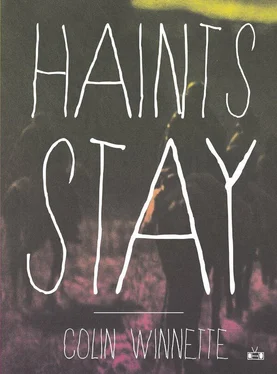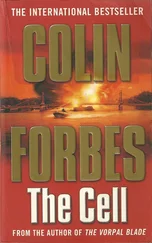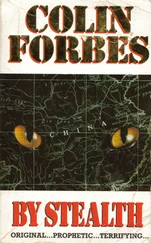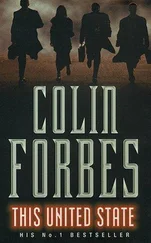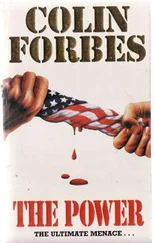Mary was a good companion. She told stories about bobcats and wild horses. Her father took in animals and nursed the sick ones. They’d owned over a dozen dogs in her lifetime, and she was just now twelve. They currently owned three. One was all black and had lost a paw.
“Just like you,” she said.
They were leaning against the horse fence and watching the ponies. They had two mild ponies her father had discovered at a stream near a canyon.
“He saved them,” she told Bird.
“I’d like to get it back some day,” said Bird, examining his bandages. They were white and clean, rather than soaked in brown and yellow as they had been the day before.
“You won’t get it back some day,” said Mary, “if I know anything about anything. It’s okay, though. Nobody around here minds and there’s still plenty you can do.”
“It does not always feel gone,” said Bird, eyeing approximately where his hand would have been.
“Oh,” said Mary, “that’s something I read about. That’s a special trick your mind is playing. That’s interesting. Will you describe it to me? What’s it like? How real does it feel?”
“Very real,” said Bird, “all the way.”
“Isn’t that something?” said Mary. “You are like a soldier returned from war. I am like your patient wife who has been waiting all along for you to return. But I am not really like your wife at all, I suppose. You are one of the things John brings home, not exactly a husband.”
“I could be a husband,” said Bird. “I could be anything.”
“Not really,” said Mary. “Plus, you are young and a cripple now.”
“I’m not,” said Bird.
“I don’t mean anything by it,” she said. “I love the dogs and ponies alike. Dad brings home good things and makes everyone’s life better.”
“What’s that one’s name?”
“I call him Little One.”
“Because he’s the littler.”
“Yes.”
“And the other?”
“Friendly,” said Mary, “but he is not exactly friendly outside of the name. It is more a joke my dad and I make.”
The ponies kept their distance of the fence and Bird quickly lost interest. The project of the day was to learn Mary’s chores, to follow her around and see what she was responsible for and how he could help, eventually.
“You’re healing now,” John had said, “and we’re happy to care for you until you’ve got back your strength. After that, everyone who can help out around here, helps out around here. It’s only fair.”
Bird was learning, though, that Mary didn’t take her responsibilities as seriously as one might, given the family’s low numbers and all that needed to be done. Her jobs were fairly simple too. Feeding the horses was a matter of sacks and proper distribution. She dragged the sacks instead of carrying them, spilling their contents indiscriminately. She gave the animals ears of corn in unequal amounts. Some got none. She was to feed the dogs too, but she told Bird they mostly fended for themselves. She assured him she would put the scraps from each meal in their bowls, in case they came sniffing around, but there was no need to worry too much about it. They were ungrateful anyway, the dogs. Sometimes they knocked her over if she lingered at their dishes too long. So she made a habit of steering clear of the dogs when she could and pouring kitchen scraps over the back porch, aiming more or less for the dishes below.
Instead of chores, Mary liked to talk and walk and show you things. At least she liked to talk and walk and show him things. He did not know what she would be doing if he were not around to soak her up.
“Dad is a minister but does not preach. Mom is a musician and sometimes she goes to town to play in the church or on a porch near the post office. She used to not talk at all, when she was younger. Dad took her in. She got normal and started to talk more. I used to ask her why she did not talk and she said it was because she did not have a thing to say. It does not make sense to me and seems like a lie. How can we live in this world and have nothing to say about it?”
They were in a field. Grasshoppers the size of biscuits bent long blades of grass back down toward the earth, and sprang up to strike Bird and Mary on the neck, chest, and arms.
Bird was swatting at them, trying to crush the landed ones beneath his boot.
“They do not bite,” said Mary. “It’s just a hello.”
Bird grabbed one from his shoulder and crushed it in his
hand.
“Gross,” said Mary. “You should be more agreeable.”
Bird apologized. He’d never seen anything like it. It looked like a creature. He did not like creatures or things he did not know that came at him.
“Lots of things are going to come at you,” said Mary. “It is only the world saying hello.”
“I don’t agree with you,” said Bird.
“Well, I’m right about it,” she said.
“Lots of things are not saying hello. They’d like to hurt you. Every man must protect himself.”
“I agree with you there,” said Mary. She plucked a grasshopper from a blade and held it out to Bird in her palm. “But not here.” The grasshopper leapt, but not before eliminating in Mary’s cupped palm. “Oh!” She rubbed either side of her hand into the billows of her dress. “He’s wet my hand.”
That made Bird laugh, seeing her so mildly put out.
“You have a nice look when you’re put out,” said Bird.
“That’s not a nice thing to say,” said Mary. She was hurt and it showed in the way she held her face.
“I meant nothing by it.”
“Say I look nice all the time.”
“You do.”
“Say the words.”
“You look nice all the time.”
“Thank you, little bird.”
“You can call me just Bird.”
“I know,” said Mary. “But you are little. You are one-third bird.”
“I won’t always be little.”
“But you are little now. Even littler than me and I am the littlest.”
“What do these things do?” said Bird, nudging the crushed grasshopper with his toe.
“Eat,” said Mary, “and hop. They don’t have much to go on.”
“Then why are there so many?”
“Because there is room for them, I guess,” said Mary.
When they were finished in the field they went around to the barn and Bird watched her feed the horses. She made a mess of it. She put no care into it at all. She obviously did care about the horses, though. She said nice, encouraging things to them and warmed their noses with her hands. But she did not do an even job of feeding them and she did not put forth the effort to get each and every one of the seven an ear of corn of their own. She gave extra corn to the littlest one, and the all white one, and one she thought seemed in a particularly good mood. She fed the tan one and the black one with white stockings evenly. Then she got distracted by their water bucket, how full of slop it was, and she playfully scolded the stockinged horse for poisoning the others.
“He’s a rascal, you see,” she explained to Bird. “He’s always up to something sneaky, but it’s because he has an active mind and we keep him locked up in here all day.”
“I have seen horses before,” said Bird.
“Bully,” said Mary.
“I saw a mass of horses ride through a clearing like hornets from a nest.”
“You saw a stampede,” said Mary.
“I saw a stampede,” said Bird. “They tried to kill me.”
“There you go again,” she said.
She dumped the sludgy water in front of the barn and took the bucket to the spigot around back.
Bird examined the horses but did not know what he was looking for. Some kind of kinship. Something that bound them together and made them all horses in the same situation. He spotted nothing but similarities in the ways they moved and held their faces, but even those were fairly distinct from horse to horse when he really thought about it.
Читать дальше
